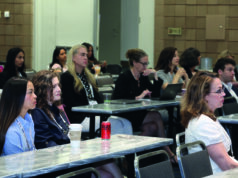
For the first time, all those who are part of the five Society for Vascular Surgery (SVS) membership sections have educational presentations geared specifically to them at the Vascular Annual Meeting (VAM).
VAM has offered education targeted to vascular physician assistants (PAs) for several years, with a section for those in the outpatient-based setting added after that. The SVS recently established three additional membership sections, for women, young surgeons and those in community practice. This year, at VAM 2022 in Boston, all have educational meetings tailored to their needs and career settings and stages.
“These sessions let those who lead those membership sections present what they believe are the most pressing topics and issues for these membership groups,” said William Robinson III, MD, chair of the SVS Postgraduate Education Committee, which oversees this and a host of other educational programming.
“They all work in the vascular surgery field, yes. But the needs of young surgeons differ from older surgeons in specific ways. Women and PAs, likewise, have issues specific to them. We’re very excited to add these personalized educational sessions this year.”
Thursday sessions are for PAs, women and young surgeons. Friday will feature programming for community practitioners and those in the outpatient setting, now known as the Sub-Section on Outpatient and Office Vascular Care (SOOVC); those sessions will be highlighted in the on-site editions of Vascular Specialist@ VAM, the new name of the VAM daily newspaper.
Physician Assistants: PAs will enjoy lunch and networking from 11:30 a.m.–1 p.m., with their education session following from 1 to 5 p.m (Hynes Convention Center, Room 304/306).
“We selected the topics based on a combination of a PA education survey, topics of interest and what we have enjoyed at past conferences,” said Holly Grunebach, PA-C, chair of the PA Section Steering Committee. The goal, she said, is to present a meaningful program plus get as many physician assistants involved as possible.
Topics include several presentations on imaging, including one from the Society of Vascular Ultrasound; complex abdominal aortic repair cases; managing penetrating vascular trauma; chronic limb-threatening ischemia; and a case presentation on acute aortic occlusion in a COVID-19 patient.
The group will also hear presentations on leadership; multidisciplinary management; venous insufficiency and varicose veins; managing venous ulcerations wounds. The session will end with “Optimal imaging modalities and interpretation review for aortic disease” and “Detecting and treating the silent killer: Review of abdominal aortic aneurysms from presentation to intervention.”
The hope is that PAs “gain clinical knowledge, explore new ways to practice and make connections with providers working in the same specialty,” said Grunebach. It is what makes the membership section “so unique and valuable to physician assistants practicing in vascular surgery,” she added.
Women’s Section: Audra Duncan, MD, and Maureen Sheehan, MD, will co-moderate the women’s section session, “Supporting Women Vascular Surgeons, from Recruitment Through Senior Leadership,” from 1:30–3 p.m. Thursday (Room 210).
Duncan co-chairs the section Steering Committee with Palma Shaw, MD, who will introduce the program. The 90-minute presentation will cover items of particular importance to women surgeons, including radiation, logistics and wellness for pregnant surgeons, and optimal practice partnership scenarios for women.
The various stages of a woman’s career also will be discussed, including those of the youngest generation of women vascular surgeons, the impact of mentors and sponsors on leadership advancement. Julie Freischlag, MD, SVS’ only female president to date and the current president of the American College of Surgeons, will discuss leaving a legacy.
“We worked together with our steering committee, which includes representatives from four stages of careers (trainee, early-career, mid-career and senior surgeon) and tried to address a critical issue at each stage,” said Duncan.
“In addition, we wanted topics that would address support of women’s careers that would speak to both men and women who want to mentor, hire, retain and guide women surgeons.”
Young Surgeons Section: The needs of young surgeons are front and center in the session devoted to the new section: “Navigating the Launch of Your Career as a Young Surgeon,” from 3:30–5 p.m. Thursday (Room 210). Topics include how to become indispensable in that first year of practice, navigating workplace politics and mentors, sponsors and coaches.
Michael McNally will tell attendees all about the “Worst mistakes I made in my first years of practice.” The final two talks will focus on research collaboration and the Vascular Quality Initiative, and leadership. Moderators are Edward Gifford, MD, Chelsea Dorsey, MD, member and chair, respectively of the section Steering Committee, and Jeanwan Kang, MD.
Community Practice Section: Community practitioners will meet from 1:30–3 p.m. Friday (Room 210) to discuss “Starting Your Own Independent Practice— What you Need to Know.” The session is being co-moderated by Daniel McDevitt, MD, and Sean Lyden, MD.
Sub-Section on Outpatient and Office Vascular Care: Members will be discussing “Providing Outpatient Vascular Care in the Office-based Lab (OBL)— Evaluating Trends, Quality and Value-based Care” from 3:30 to 5 p.m. in Room 210, also on Friday. Robert Molnar, MD and Jayer Chung, MD, will be at the helm.












